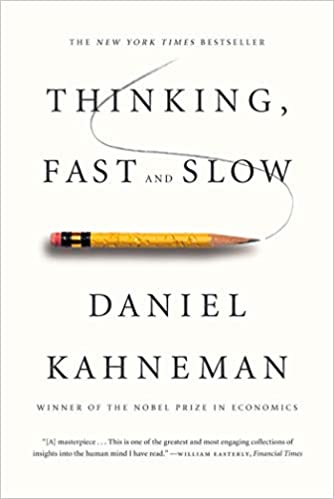
Thinking Fast and Slow
by Daniel Kahneman
⏱ 16 minutes reading time
🎧 Audio version available
When it comes to dealing with negative emotions, there are several ways we tend to react.
Our instinct can be to avoid acknowledging the negative emotion entirely. This can involve avoiding all situations that can lead to feeling bad. When we want to avoid failure, we stop taking risks; when we want to stop feeling rejected, we stop talking to new people, and so on.
Avoidance can also come in the form of actively trying not to feel these negative emotions. This means that whenever we feel them coming on, we resort to finding comfort and distraction in food, alcohol, and harmful substances. Or just spending hours mindlessly staring at the TV or scrolling through social media to avoid thinking about it.
And then we try denying these feelings. When someone asks us about them, we deny that we’re feeling angry or hurt.
It comes to the point that this denial involves lying to ourselves. We don’t validate those negative emotions. We dismiss them by saying that it’s not that bad. Then, we end up bottling up that emotion until it explodes. It will make itself known sooner or later.
Intense emotions are not a bad thing. You don’t need to hide, avoid, or dismiss them. Here is how you can master them.
Acknowledge Your Feelings
Becoming a master of your emotion actually involves feeling more. Ignoring your emotions will only work for the short-term. You need to acknowledge them first and formost. These feelings are a part of you, and they can be wielded to your advantage, if you know how.
Once you have acknowledged them, think about what you want to do with them. Do you need an outlet to vent your anger? Do you need to scream? Do you need to throw things around?
It goes the other way, too. Do you want to jump up and down with joy? Share the happy news with everyone around you?
Put a Name to What You’re Really Feeling
When we’re in a situation where we have “lost it,” we don’t often realize what’s happening until that emotional roller-coaster is already well under way. The first step to keeping a tight grip on that emotional train? It’s to handle the emotion when you start to feel it.
The moment you start feeling it, it’s important to put a name to it. Identify what this emotion is and why you are feeling it.
Ask yourself questions like, what are you truly feeling right now? Are you really angry or hurt or disappointed?
Or is there something else entirely that’s affecting you, triggering this onslaught of feelings?
Ask yourself if you’re feeling angry? Or are you just confused?
When you’re dealing with someone who is causing these intense emotions in you, stop for a moment and think about this: could this situation have another explanation that makes sense? Could that person offer an explanation? Are they stressed? Sick?
Learning to identify and distinguish your emotions can help you regulate your emotions better because it offers you more information. This will tell you how to adjust your behavior accordingly. Numerous studies before have shown that people who can identify and distinguish between different emotions are less likely to feel overwhelmed and be tempted into a binge session.
Keep Your Body Healthy
What does keeping your body healthy have to do with mastering and controlling your emotions? Everything.
There is a science to eating healthy, exercising regularly, and getting a sufficient amount of sleep. All of these contribute to how you react to situations. We’re looking to help you get a healthy emotional life, and this is the “healthy” part of it.
Getting ahead of your emotions can involve physical activity. When you feel overwhelmed, go for a walk or hike in the beautiful outdoors.
Want to hear the science part? You’re not just getting some fresh air, which will clear your thoughts. You’re reducing neural activity in your brain’s subgenual prefrontal cortex, meaning that you’re improving your mental well-being. You’re getting an entirely new perspective about your experience and situation.
Study Up
So, a sufficient amount of exercise, of sleep, and getting proper nutrition goes a long way, but you know what else helps? Reading.
Reading and studying, finding out why you’re feeling this way, can help you understand yourself better and thus, help you find better ways to cope.
Literature especially gives us an unprecedented look into someone else’s narrative and into their own experiences. You can see how they reacted to similar situations. You can criticize what they did, and you can take the best parts of their reaction and use them the next time you find yourself in a bind.
Meditate
Meditating is the unsung hero of mastering life. It offers you a chance to relax, breathe, and review yourself.
You get to experience your emotions in all their intensity and without any judgment, and then let them go.
Keep Track of Your Success
We tend to become fixated on controlling ourselves and then beating ourselves up when we don’t succeed that we forget about all the times that we did succeed.
When you keep track of that success, of your triumphs and positive experiences, you become more motivated. Moreover, you start feeling more in control of yourself.
The best way to do this is to keep a journal in which you can physically write things down. Both the bad and the good.
This is your mood journal, and it’s an incredibly important tool. A mood journal helps you get to know yourself.
After you identify and write down your feelings, write down what your reaction to experiencing that emotion was. Eventually, you’ll start noticing a pattern. When you put your thoughts on paper, you get to reflect on them in a deeper way than you would have been able to if you had just been agonizing over them in your head.
In a short time, you will begin recognizing which situations result in the more out of control emotional responses– such as family issues or a stressful work environment.
This is a major step from just identifying your emotions. Now, you’re identifying your triggers.
Now, you’re able to prepare yourself against these triggers.
The next time you experience an intense emotion, write it down as soon as it happens or as sson as you can. Journaling works miracles when you do it on a daily basis.
Regulation versus Repression
Emotions aren’t something that we’re better off without. They give our lives meaning and fill them with color and excitement. Why would you want to stop experiencing life fully by repressing your emotions?
It’s normal to feel disarmed by overwhelming emotions. And it goes both ways: when something completely wonderful happens or when something tragic occurs. But we know that out of control emotions can lead to outbursts, trouble with your relationships, conflicts at work or school, or in extreme cases, it can lead to a desire to use external substances to help cope.
The truth is there is no on/off switch to our emotions. On your journey to gaining mastery over your emotions, locking them in a safe or sweeping them under the rug is the worst thing you can do.
Being a emotion master means that you have a healthy grasp on yourself.
In order to regulate your emotions, you can’t downplay them. You need to identify and process them.
When you’re prone to hyperventilating after receiving extreme news, it’s time to look at your reaction. If it’s collapsing, screaming, or sobbing, taking a moment to review your reaction is advisable.
The first thing you want to do is to validate what you’re feeling. It’s easy for people to tell you to calm down or to stop crying, but this is damaging to your emotional well-being because it invalidates your feelings.
Trust that You’ve Got This
There’s a reason why becoming a master of anything takes a long time. It will take trial and error to learn. Confidence is key, and confidence comes with practice.
The more you practice, the stronger you’ll become. And now, people will look at you, wondering how you control your emotions so well.
What Is Snapreads?

With the Snapreads app, you get the key insights from the best nonfiction books in minutes, not hours or days. Our experts transform these books into quick, memorable, easy-to-understand insights you can read when you have the time or listen to them on the go.



